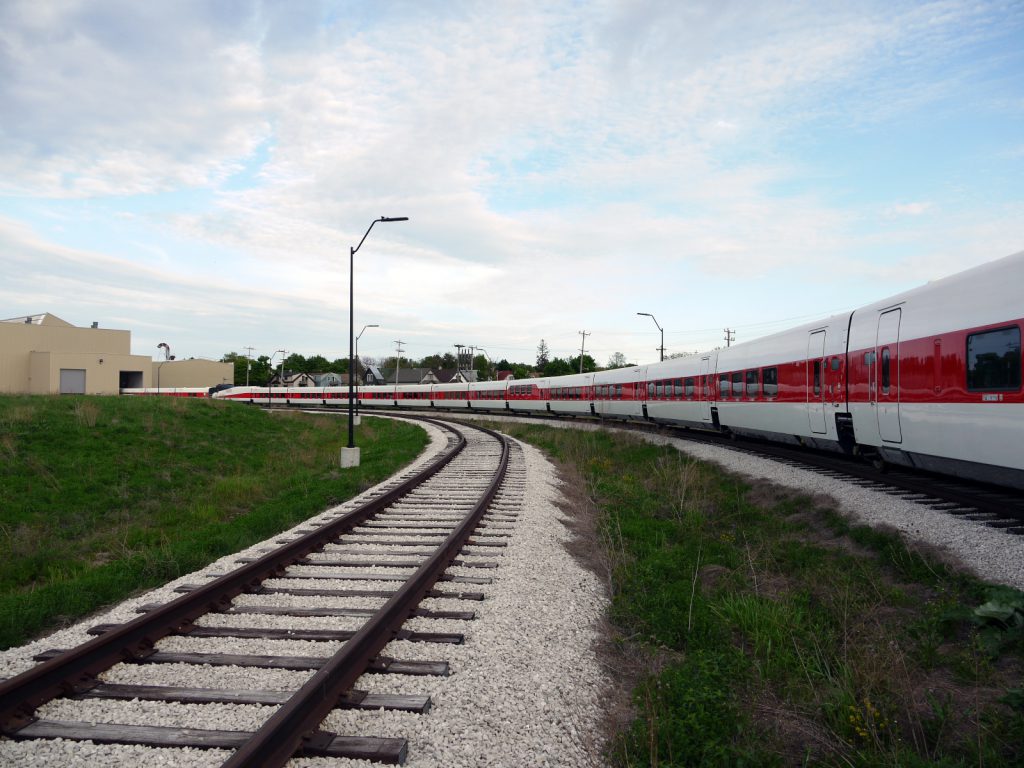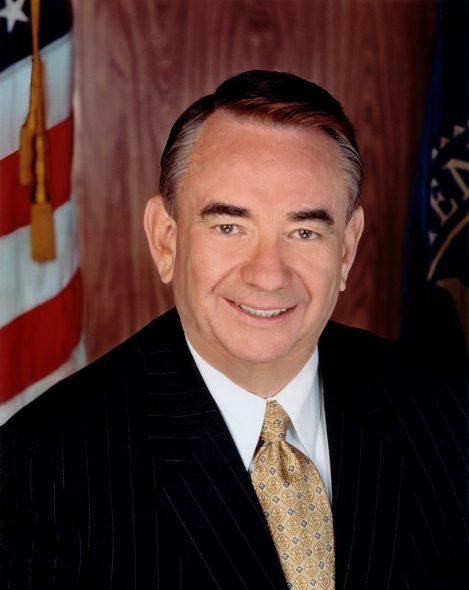How Republicans Became Anti-Train
The politics of resentment replaced business-oriented development, as Tommy Thompson would learn. Part 8 of series.
It’s difficult to tell the story of Wisconsin’s high-speed rail saga without delving into the evolution of the state’s politics.
The train, arguably, was along for the ride.
Consider Tommy Thompson, the longtime Republican governor who grew up loving trains as a boy in Elroy and first proposed Wisconsin’s high-speed rail line in 1999.
Thompson left the governor’s office in 2001 for a job in then-President George W. Bush‘s administration. He flirted with running for president in 2007, then weighed a run for a Wisconsin U.S. Senate seat in 2010 before deciding against it.
But in 2012, there was an opening for Wisconsin’s other U.S. Senate seat. And that year, there would be no stopping Thompson from running.
Thompson’s message during most of the campaign hearkened back to his record as governor: He was the “original conservative” and had won more statewide elections than any Republican in history.
This wouldn’t be like Thompson’s elections for governor, which he won by landslides. To win the Republican primary, he’d need to play the game under the new rules.
That meant a new take on some of his old positions, including the train.
Thompson was speaking to the Milwaukee Press Club early that year when someone in the audience asked if he would’ve turned down the federal money for the train like then-Gov. Scott Walker did.
“He made a decision, and I support him on that,” Thompson told the crowd.
In the new world of politics, Thompson, the governor who originally proposed the high-speed train was standing by Walker, the governor who vowed to kill it.
‘We Teamed Up Together’
The evolution in the Republican Party that led to this was a long time coming and was shaped by a combination of events and influential people. And for a time in the Unites States, nobody was more influential in Republican politics than Racine native Paul Weyrich.
Although he’s not a household name, it’s hard to overstate Weyrich’s behind-the-scenes influence on the modern GOP. In the 1970s, he started bringing conservative factions together and mobilizing them.
“Those people were not active in politics and I served as sort of a coach to get them active in the political process,” Weyrich told C-SPAN in 2005.
Weyrich coined the term “moral majority,” and worked with Rev. Jerry Falwell to unite the so-called religious right.
He helped start influential groups ranging from the Heritage Foundation, a conservative think tank, to the American Legislative Exchange Council, otherwise known as ALEC.
When Weyerich died in 2008, high-ranking members of the Republican party flocked to pay him tribute.
“The last 40 years of Washington politics is in a sense a series of footnotes to Paul Weyrich,” said longtime conservative columnist George Will.
“I want to be like Paul Weyrich when I grow up,” said then-Congressman and future Vice President Mike Pence.
Weyerich’s influence was felt far and wide in the GOP, but his Wisconsin roots gave him a chance to become friends with another prominent Republican: Thompson.
The two shared a common passion.
“He loved trains,” said Thompson. “He loved them, I loved them, and we teamed up together. So there was really a strong conservative movement in the United States thinking it would be good to have alternative transportation services.”
In early 2008, Weyrich was on a national commission that was recommending wholesale changes to the nation’s transportation system. Weyrich felt strongly that passenger rail needed to be a part of it.
He viewed passenger rail as a distinctly Republican issue, even though he knew public transportation had a bad reputation among some Republicans. In a hearing before Congress, he suggested that conservative backlash was a relatively recent phenomenon that began in the 1960s when the government started spending more on buses.
“Transit, after the Great Society, became a program that really was aimed at the transit-dependent and it became thought of as a program for the poor and the elderly and so on,” Weyrich told Congress.
But Weyrich said there was a time when cities all over America had a different kind of public transportation: streetcars.
He pointed to commuter rail in some of America’s biggest cities as a modern success story, like Chicago’s Metra train.
“Most of the people riding that commuter rail system are Republicans,” he said. “Most of them are business people. Most of them come into Chicago with their suits and briefcases. It is a beautifully run system.”
When Weyrich said all this, there were already rumblings of a federal stimulus package that would jump-start the economy. Democrats would soon follow through with an $8 billion investment in high-speed rail.
But less than a year after he spoke before Congress, Weyrich died, and one of America’s most influential conservative voices was no longer there to join Democrats in the push for passenger rail.
‘The Politics Of Resentment’
Weyrich’s death happened around the same time as the rise of the Tea Party, when conservatives were growing increasingly angry with government. And this anger was reshaping the GOP all across the country.
University of Wisconsin-Madison political scientist Kathy Cramer saw firsthand how it was influencing politics in Wisconsin.
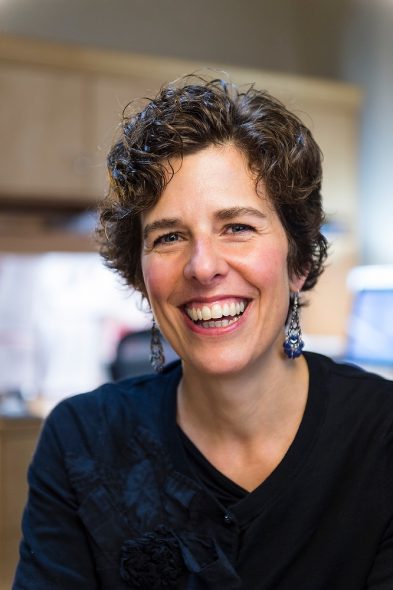
Kathy Cramer, a professor of political science at the University of Wisconsin-Madison, says politicians, rather than the public, often set the political agenda and shape public sentiment. Photo by Jeff Miller/UW-Madison.
From 2007 to 2012, Cramer conducted a research project that took her to more than two dozen communities across the state. She thought she’d be learning all about peoples’ views on issues like immigration and health care, but she discovered a deeper concern in small towns.
Cramer didn’t realize this feeling was so prevalent. But as she visited small towns — most of which leaned conservative — she realized this was something they’d felt for years.
And around 2010, when Walker came on the scene, these small town residents really liked him.
What Walker was saying about the proposed high-speed train that year resonated, Cramer said.
She remembers it in one debate in particular, shortly before Walker’s primary election in 2010.
When he was asked about the train, he talked about how the money would go exclusively to Madison and Milwaukee, and nowhere else. Walker rattled off a long list of smaller Western Wisconsin places that he said would be shut out, from “the cutout up to Black River Falls” to “Coon Valley.”
“What sticks out to me about this, he paints you this picture of small town, rural Wisconsin, right?” Cramer said. “He’s so clearly aligning himself with people outside of Madison and Milwaukee.”
Cramer wrote a book about her research called “The Politics of Resentment,” and Walker is a big part of it. A lot of what he talked about and did in his first year in office spoke to voters in small-town Wisconsin who felt like they weren’t getting their share.
“You could say that (Republicans) exploited this sentiment or you could say that they heard this resentment and listened to it and actually responded,” she said. “It just depends on where you’re coming from.”
Walker ushered in a new kind of politics in Wisconsin. Even his most outspoken supporters would say he was polarizing.
And as Wisconsin politics got more and more combative, Wisconsin Republicans were with him in a big way.
Walker had only been in office for a few months when he rolled back union rights, prompting massive protests. These protests, and a subsequent attempt to recall Walker, united Republicans.
This was the new world of politics that Thompson was walking into when he decided to run for U.S. Senate — a Wisconsin that was as divided as ever.
A Comeback Cut Short
Thompson started sending signals that he would get back into politics in 2011, naming prominent fundraisers and campaign chairs.
In the past, Thompson’s presence in the race would have been enough to scare other candidates away, but there would be no coronation this time around.
“He didn’t think he was going to have a primary opponent,” said Thompson biographer Doug Moe. “And he ended up with three, and some of them pretty well funded.”
Thompson would face Jeff Fitzgerald, the Speaker of the state Assembly who pushed through Walker’s agenda, former U.S. Rep. Mark Neumann, who ran against Walker in the 2010 primary for governor, and Madison businessman Eric Hovde, whose campaign was run by a former Walker aide.
Almost immediately, the new power brokers of the Republican Party questioned whether Thompson was conservative enough to fit with the new GOP.
During an interview on WTMJ-AM in September of 2011, conservative talk radio’s political kingmaker Charlie Sykes asked Thompson about a newspaper article that referenced the former governor’s mix of “pragmatism, big tent Republicanism and government activism.”
Sykes asked Thompson how he responded to the suggestion that he might not be in sync with the current generation of conservatives.
Other critics were more blunt. The national conservative group “Club for Growth” released an attack ad that tried to undercut Thompson’s campaign before it was even off the ground, calling him a career politician who had supported tax and spending increases as governor.
Thompson would spend the next year on the defensive, explaining to GOP primary voters why he’d taken a variety of positions during his decades in the governor’s office and the Bush Cabinet.
Those positions included his previous support for a rewrite of the nation’s health care laws that prominent Democrats — including President Barack Obama — viewed as an endorsement of the Affordable Care Act.
They also included his longtime support of a passenger rail line linking Madison and Milwaukee.
Thompson said the project that received federal stimulus funding wasn’t quite what he had in mind, and he supported Walker’s decision to block it.
“I would have changed high-speed trains into really being high-speed trains,” Thompson said. “I would have just had it immediately Milwaukee to Madison. No stops. Make it high-speed and make it my train.”
Thompson battled on through a bruising primary where his conservative credentials were questioned time and again by political newcomers.
He won, but barely. Thompson received just 34 percent of the vote. Hovde finished right behind him with 31 percent.
Going into the general election, Thompson thought he’d be a shoo-in. But the campaign slipped away.
This was Democratic Congresswoman Tammy Baldwin‘s moment. She defeated Thompson by about 6 percentage points to become the nation’s first openly gay U.S. Senator.
And Thompson’s attempt at a political comeback was over.
‘Politics Changed’
Thompson biographer Moe said this defeat stung the former governor so much that they took a hiatus from working on his book. It’s a topic he doesn’t like to talk about, Moe said.
When Thompson spoke with WPR’s “Derailed,” we asked whether his run for Senate caused him to change what he was saying about the train. He said he didn’t remember.
But the Thompson of 2019 sounds a lot more like the Thompson of 1999 when it comes to the train. He still thinks that his idea was a good one, and that it could have worked.
And Thompson gets a little worked up over the argument today’s conservatives use against trains — that they take too much government money to run.
“People say why should the federal government subsidize rails? Well you subsidize passengers in your cars by building the highways,” Thompson said. “You subsidize air travel — huge amounts of federal dollars goes into subsidizing all the airports that are in America. So you put it apples to apples, every one of the modes of transportation are being subsidized.”
But even if Thompson disagrees with where Republicans ended up on trains, he said he realizes how they got there. At some point, there just weren’t prominent conservative voices pushing for passenger rail anymore
“I wasn’t on Amtrak anymore pushing it,” Thompson said. “Paul Weyerich and the conservative movement had died and was not the voice of reason out there with conservatives. Talk radio got involved and was opposed to it. And, politics changed.”
The other thing “Derailed” wanted to know from Thompson is a little harder to answer: How did politics change so quickly? Why are things so divided now? How did the idea of this train go from futuristic and forward-looking to boondoggle in just a decade?
“I’m not going to criticize anybody because I was governor at a different time and I loved trains and I loved my vision of making Wisconsin stronger and better,” Thompson said. “And other people come in and have a different vision. And people vote for them. And rightly so.”
Thompson was asked about a half-dozen versions of this question, and his normally booming voice got softer and softer. He kept saying variations of the same answer: Democracy evolves. People change. Times change.
Listen to the sixth episode of the podcast here.
As Politics Evolved, Wisconsin’s Train Was Along For The Ride was originally published by Wisconsin Public Radio.
This story is part of WPR’s “Derailed,” a limited-run podcast about Wisconsin’s high-speed rail line that never was. It’s a look at how the project came together, how it fell apart, and what it says about how Wisconsin has changed. Never miss an episode by subscribing now on your favorite podcast app or at wpr.org/derailed.
Derailed
-
Talgo Trains Return to Milwaukee
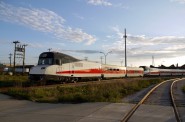 Dec 10th, 2019 by Bridgit Bowden and Shawn Johnson
Dec 10th, 2019 by Bridgit Bowden and Shawn Johnson
-
Could Doyle Have Saved High Speed Rail?
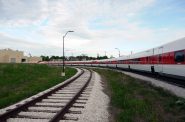 Nov 29th, 2019 by Bridgit Bowden and Shawn Johnson
Nov 29th, 2019 by Bridgit Bowden and Shawn Johnson
-
How Waterloo Lost High Speed Rail
 Nov 13th, 2019 by Hannah Haynes
Nov 13th, 2019 by Hannah Haynes
Transportation
-
Congestion Pricing Cuts Air Pollution in New York City
 Dec 14th, 2025 by Jeff Wood
Dec 14th, 2025 by Jeff Wood
-
FTA Tells Milwaukee to Crack Down on Fare Evasion — Even Where Fares Don’t Exist
 Dec 12th, 2025 by Graham Kilmer
Dec 12th, 2025 by Graham Kilmer
-
Will GOGO’s Bus Service Ever Get Going?
 Dec 9th, 2025 by Jeramey Jannene
Dec 9th, 2025 by Jeramey Jannene


